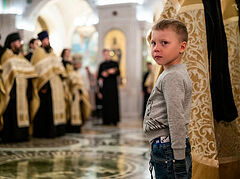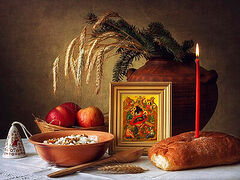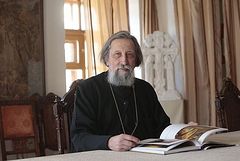Every fast that lasts for many days may be called a journey towards a pre-determined goal. Yet, the Nativity Fast stands out among others. The wise men, once they observed the wondrous star that foretold them about the birth of the Savior of this world, took off on their long journey towards the manger in Bethlehem. On November 28, Orthodox Christians also started on their journey, but through time. Yet, our goal remains just the same, for at the end of our forty-day sojourn, we hope to become the partakers of the great and bright feast of the Nativity of Christ.
 Winter landscape with a church. Artist: Stepan Feodorovich Kolesnikov
Winter landscape with a church. Artist: Stepan Feodorovich Kolesnikov
Our personal formula of fasting
What are the constituents of a successful fast? How can we determine the level of its “success”? In the early days of fasting, we are like children who open their pristine workbooks at the beginning of a new school year in September. I still remember how I was so eager to write those exceptionally beautiful and correct letters there. And how I grew indifferent to that activity once I made my first blunders and mistakes.
But no job can ever be fail-safe, and you can't fast without mistakes either. There can be no once-and-for-all solutions as to how to fast, because life is a creative process.
There can be no out-of-the-box solutions on how to fast, because life is a creative process
“A living faith is characterized by your personal choice—not as a template or instructions to execute as you’ve read or heard somewhere, but your own personal decision that stems from your knowledge, perception, and experience. It is always about a certain formula, and it’s impossible to guess its exact components,” says Archpriest Alexiy Kashirin, rector of the Church of the Great Martyr and Healer Panteleimon in Stepnoe settlement, Saratov region.
Restriction of foods is an important part (though not the most significant one!). Food occupies an important place in our life. As we sit down for a Lenten meal three times a day, no longer seeing our familiar and beloved animal products, our thoughts will invariably turn to fasting: why we fast and what it leads us to.
“As for the measure and severity of fasting, our decision depends on the reasons for why we fast, and it can be divided into two groups. There are the external factors—our age, health, job conditions, familial relationships, and financial situation. Then, there are intrinsic factors—will power, boldness, and whether we lament our sins or are willing to sacrifice something for Christ. All these reasons must be evaluated, weighed, and agreed upon with our father confessor. Otherwise, we will always seek to find excuses—for some, it will be to ease the rules, and for others, to make it more strict. But how useful is tht for our souls? Because in fact, this is a major question. Let us remember pride and vanity, the most powerful passions. Let us also remember St. Anthony the Great, to whom the Lord showed the devil’s works as ubiquitous snares. The only way we can overcome then all is by God’s help. Our job is to assist God to lead us to salvation, and we can’t achieve that without thought,” says Father Alexiy.
A tool for the work of the spirit
“We begin the Nativity fast. Fasting implies vigilance and attention. To be vigilant means struggling with sleep. Sleep is a state of rest and apathy, when our attention slackens. In the spiritual sense, sleep is the ultimate rest, the quietness of death. For a believer, to be vigilant doesn’t only mean staying awake in the physical sense. Sleep also prevents us in general from fighting against anything that lulls our attention, and it keeps us from seeing things that lead us to death,” Archpriest Alexander Shargunov's advice speaks of the second part of the fasting formula.
Food limitation is simply the means for spiritual work and the perfection of our soul
Restriction of food is simply the means for spiritual work and the correction of one’s soul. Without this, fasting becomes a diet.
“During the days of the Nativity fast, we must be attentive to the liturgical practice of our Church and attend church on a regular basis. Not only on Sundays, but also on weekdays,” advises Bishop Pakhomiy of Pokrovsk and Novouzensk. “During the Nativity fast, there are also certain liturgical changes. They are there to remind us: we undergo the time of fasting and we anticipate Christ’s Nativity. Before long, on the eve of the Presentation of the Most Holy Mother of God in the Temple, we will hear the Nativity canticle, “Christ is born, glorify Him: Christ comes from heaven; go to meet Him! Christ is on earth; be exalted! Sing to the Lord, all the earth! And praise Him in gladness, O people, for He has been glorified!” The stichera, troparia, and canons already include the lines that remind us of the goal lying ahead and tell us why we fast. It would be great if, with the blessing of our father confessor, we could add an additional prayer, canon or prostrations to our daily prayer rule. It is best if we don’t rely on our positive character traits, but instead seek advice from our priest and cut back on certain things. Now, what’s most important is to rise to the challenge and be easy on our neighbors.
Charitable works as the chief component of fasting
Bodily fasting is the means, whereas the spiritual sobriety and fervent prayer are the goals, with mercy being the fruit of the Lenten sojourn:
“Fasting receives its substance from alms-giving. If you fast without charity, then your fast isn’t a fast. Just as a bird cannot fly if it has no wings, fasting cannot go on without both of its wings—prayer and charity,” the holy hierarch John Chrysostom instructs us.
“When we are charitable to one another, we develop loyalty, devotion and an emotional connection in our relationships. If we do good to others, we keep those memories of them forever, as they become truly special to us. But without mercy, even our neighbors grow distant—or even become enemies. If we want our family to stand strong, with the husband never leaving his wife or the wife never leaving her husband; if we want to always keep kind and warm relationships between parents and children, then we must do works of charity for one another. If we want to change how people treat one another in our society, if we want our people to be aware of themselves as one nation, we must learn to do good for each other, so that through good works we can grow closer to one another,” says Patriarch Kirill of Moscow and All Russia, elaborating on St. John Chrysostom’s thought.
Anyone who ever fasted during the Nativity fast knows that this is truly a very challenging time of the year
Of course, it is easier said than done. Anyone who has ever fasted during the Nativity fast knows that this is truly a very challenging time of the year. Conflicts and hostilities escalate, with quarrels arising out of thin air and people playing the blame game. There is, of course, an explanation for all this:
“A fast is only a part of the external life, and the Church, with the help of a fast, increases our watchfulness as we wage war with our own sinful selves. If someone wishes to seize a fortress, it’s best to cut off its access to food and water. Likewise, during the fast, if we limit our appetites at the expense of moderation, our enemy (cravings) will capitulate. But before that happens, the enemy will want to strike back, and this will be manifested in an ever-increasing, burning desire and aggression,” explains priest Sergiy Sivoplyasov, rector of the Church of the Protection of the Mother of God in Pokrovsk (Engels).
What’s the solution?
“Hasten to share the love!” exhorts Fr. Sergiy. “We have to clearly understand that Orthodoxy can’t be defined within a certain scope of norms or standards. Every second of his life, an Orthodox believer must seek eternity, and moreover, eternity with God.”
In the hope of a miracle
No matter how difficult our path of the Nativity fast may be, it is imbued with the expectation of a miracle. It will arrive for everyone and touch everyone’s heart in its own, special way.
The journey of the Nativity fast is imbued with anticipation of a miracle. It will arrive for all of us and touch our hearts in its own, special way
For some, it will be the amazing services, while others will discover it in the quiet joy of family celebrations. Someone will become aware of its grandeur in God’s care for each of us, and so they will in turn take care of those in need. Many others will be touched by the poetic lines of Hieromonk Roman (Matyushin):
The stars rejoice yet evermore, For He is to be born!
The Milky Way effuses peace.
The one and only lonely star
Born towards dawn begins its dreamy stride.
It sparkles, gleams, as if on fire,
A near miss, and it will burst with glee;
For everyone who sees can hear it now:
O let us come! Let us rejoice, the Sun!



